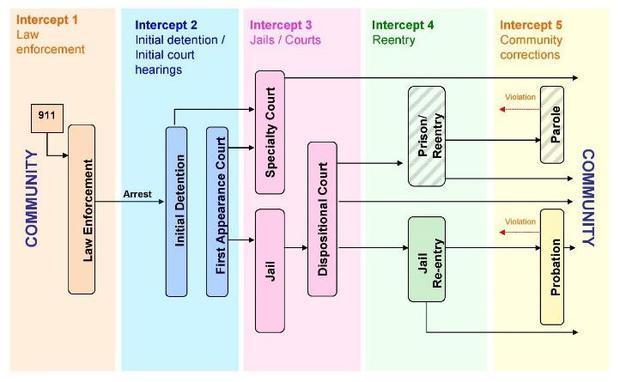Overview
The Massachusetts Community Justice Project (originally known as the Sequential Intercept Model Project) is a Massachusetts Trial Court initiative. The project was developed by the Trial Court Task Force on Mental Health and Substance Abuse. This interagency Task Force, chaired by Chief Justice Paula Carey, includes key stakeholders from:
- The Trial Court
- The Department of Mental Health
- The Department of Public Health’s Bureau of Substance Abuse Services
- The Department of Corrections
- The Middlesex Sheriff’s Department
- The Committee for Public Counsel Services
Vision and mission
The vision of the Massachusetts Community Justice Project is for communities throughout Massachusetts to collaborate across criminal justice, behavioral health, and human service sectors to promote recovery for people with mental health and/or substance use disorders, enhance public safety, and support quality of life for everyone.
The mission of the project is to support the development of lasting solutions, through collaborative community planning and action, which reduce the risk of justice involvement and recidivism among people with mental health and/or substance use disorders.
Goals and objectives
The goal of the Massachusetts Community Justice Project is to decrease the risk of justice-involvement and recidivism for people with mental illness and/or substance use disorders by:
- Increasing community collaboration between criminal justice, behavioral health treatment, and human service sectors
- Increasing ability to identify the need for behavioral health treatment and recovery support among justice-involved people
- Increasing connections to and engagement with treatment and recovery support for justice-involved people with behavioral health needs
To achieve these objectives, the project is:
- Implementing cross-systems mapping and action planning workshops using the Sequential Intercept Model
- Providing technical help to communities to support collaborative action planning, development, and implementation of evidence-based practices
- Informing stakeholders of needs, barriers, and innovations at the community level, as identified in workshops
The Sequential Intercept Model
The Sequential Intercept Model provides a conceptual framework for communities to organize targeted strategies for justice-involved individuals with mental illness and/or addiction.1 The model shows the justice system as a series of points of “interception” where an intervention can be made to prevent people from entering or going deeper into the criminal justice system.2 Points of intercept include:
- Intercept 1: Law Enforcement and Emergency Services
- Intercept 2: Initial Detention and Initial Hearings
- Intercept 3: Jail, Courts, Specialty Courts, Forensic Evaluations, and Forensic Commitments
- Intercept 4: Reentry from Jails, State Prisons, and Forensic Hospitalization
- Intercept 5: Community Corrections (Probation and Parole) and Community Support
The model provides an organizing tool for a discussion on how to best address the behavioral health needs of justice-involved individuals locally. Using the model, a community can:
- Identify local resources and gaps in services
- Decide on priorities for change
- Develop strategies to increase connections to treatment and recovery support services
Massachusetts workshops include an inventory of Intercept Zero – places in the community where people with addiction/mental illness can have their needs identified and be connected with treatment and recovery support before intersecting with the justice system – including (but not limited to):
- Harm reduction programs
- Treatment and recovery support programs
- Healthcare providers
- Homeless shelters
- Social service agencies
Community Justice Workshops
Community Justice Workshops take place in District Court jurisdictions and bring together key local stakeholders for a two-day event. Community members from local justice system, healthcare, behavioral health, recovery support and human services agencies use Sequential Intercept Mapping to determine areas where immediate steps will effect a more cohesive, integrated approach to service delivery. The second day is a half-day action planning meeting which culminates in the beginning of a local action plan for change.
Contact
Online
Address
| Last updated: | April 25, 2018 |
|---|
